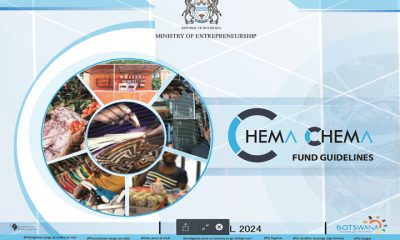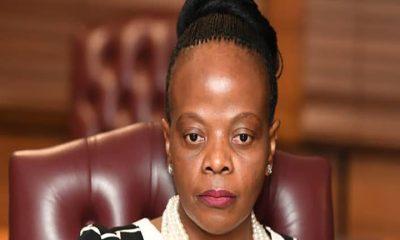PAP stands to fight corruption in Africa

Pan African Parliament (PAP) says it stands to represent all the people of the African continent and pursue the objective of facilitating the effective implementation of the policies and objectives of the African Union (AU). The organ stresses that it looks to promote the principles of human rights and democracy in Africa.
When speaking at the presentation to the Committee on Audit and Public Accounts (CAPA) of the PAP, Executive Secretary Charity Nchimunya said PAP seeks to promote transparency and accountability, as well as facilitate the capacity enhancement and independence of supreme audit institutions.
“PAP also strengthens money committees, and encourages public input at the various stages of the budget cycle and reviews all sources of revenue and expenditures, including tax expenditures.â€
The organ also encourages full implementation and domestication of the Convention and advocates for universal ratification of the Convention.
The African Union Convention on Preventing and Combating Corruption (AUCPCC) was adopted at the Second Ordinary Session of the Assembly of the AU, in Maputo in 2003.
In 2006, the Convention entered into force 30 days after the deposit of the 15th Instrument of ratification, and it is a framework that guides the AU Member States in the fight against corruption by providing standards and guidelines on how best the State Parties can fight corruption and promote good governance.
Nchimunya indicated that the Convention promotes and strengthens the development of mechanisms to prevent, detect, punish and eradicate corruption.
“It also coordinates and harmonizes policies and legislation between State Parties for purposes of prevention, detection, punishment and eradication of corruption, as well as promote socio-economic development by removing obstacles to development and fostering transparency and accountability in the management of public affairs.â€
News
Nigerians, Zimbabweans apply for Chema Chema Fund

Fronting activities, where locals are used as a front for foreign-owned businesses, have been a long-standing issue in Botswana. These activities not only undermine the government’s efforts to promote local businesses but also deprive Batswana of opportunities for economic empowerment, officials say. The Ministry of Trade and Industry has warned of heavy penalties for those involved in fronting activities especially in relation to the latest popular government initiative dubbed Chema Chema.
According to the Ministry, the Industrial Development Act of 2019 clearly outlines the consequences of engaging in fronting activities. The fines of up to P50,000 for first-time offenders and P20,000 plus a two-year jail term for repeat offenders send a strong message that the government is serious about cracking down on this illegal practice. These penalties are meant to deter individuals from participating in fronting activities and to protect the integrity of local industries.
“It is disheartening to hear reports of collaboration between foreigners and locals to exploit government initiatives such as the Chema Chema Fund. This fund, administered by CEDA and LEA, is meant to support informal traders and low-income earners in Botswana. However, when fronting activities come into play, the intended beneficiaries are sidelined, and the funds are misused for personal gain.” It has been discovered that foreign nationals predominantly of Zimbabwean and Nigerian origin use unsuspecting Batswana to attempt to access the Chema Chema Fund. It is understood that they approach these Batswana under the guise of drafting business plans for them or simply coming up with ‘bankable business ideas that qualify for Chema Chema.’
Observers say the Chema Chema Fund has the potential to uplift the lives of many Batswana who are struggling to make ends meet. They argue that it is crucial that these funds are used for their intended purpose and not siphoned off through illegal activities such as fronting. The Ministry says the warning it issued serves as a reminder to all stakeholders involved in the administration of these funds to ensure transparency and accountability in their disbursement.
One local commentator said it is important to highlight the impact of fronting activities on the local economy and the livelihoods of Batswana. He said by using locals as a front for foreign-owned businesses, opportunities for local entrepreneurs are stifled, and the economic empowerment of Batswana is hindered. The Ministry’s warning of heavy penalties is a call to action for all stakeholders to work together to eliminate fronting activities and promote a level playing field for local businesses.
Meanwhile, the Ministry of Trade and Industry’s warning of heavy penalties for fronting activities is a necessary step to protect the integrity of local industries and promote economic empowerment for Batswana. “It is imperative that all stakeholders comply with regulations and work towards a transparent and accountable business environment. By upholding the law and cracking down on illegal activities, we can ensure a fair and prosperous future for all Batswana.”
News
Merck Foundation and African First Ladies mark World Health Day 2024

Merck Foundation, the philanthropic arm of Merck KGaA Germany marks “World Health Day” 2024 together with Africa’s First Ladies who are also Ambassadors of MerckFoundation “More Than a Mother” Campaign through their Scholarship and Capacity Building Program. Senator, Dr. Rasha Kelej, CEO of Merck Foundation emphasized, “At Merck Foundation, we mark World Health Day every single day of the year over the past 12 years, by building healthcare capacity and transforming patient care across Africa, Asia and beyond.
I am proud to share that Merck Foundation has provided over 1740 scholarships to aspiring young doctors from 52 countries, in 44 critical and underserved medical specialties such as Oncology, Diabetes, Preventative Cardiovascular Medicine, Endocrinology, Sexual and Reproductive Medicine, Acute Medicine, Respiratory Medicine, Embryology & Fertility specialty, Gastroenterology, Dermatology, Psychiatry, Emergency and Resuscitation Medicine, Critical Care, Pediatric Emergency Medicine, Neonatal Medicine, Advanced Surgical Practice, Pain Management, General Surgery, Clinical Microbiology and infectious diseases, Internal Medicine, Trauma & Orthopedics, Neurosurgery, Neurology, Cardiology, Stroke Medicine, Care of the Older Person, Family Medicine, Pediatrics and Child Health, Obesity & Weight Management, Women’s Health, Biotechnology in ART and many more”.
As per the available data, Africa has only 34.6% of the required doctors, nurses, and midwives. It is projected that by 2030, Africa would need additional 6.1 million doctors, nurses, and midwives*. “For Example, before the start of the Merck Foundation programs in 2012; there was not a single Oncologist, Fertility or Reproductive care specialists, Diabetologist, Respiratory or ICU specialist in many countries such as The Gambia, Liberia, Sierra Leone, Central African Republic, Guinea, Burundi, Niger, Chad, Ethiopia, Namibia among others. We are certainly creating historic legacy in Africa, and also beyond. Together with our partners like Africa’s First Ladies, Ministries of Health, Gender, Education and Communication, we are impacting the lives of people in the most disadvantaged communities in Africa and beyond.”, added Senator Dr. Kelej. Merck Foundation works closely with their Ambassadors, the African First Ladies and local partners such as; Ministries of Health, Education, Information & Communication, Gender, Academia, Research Institutions, Media and Art in building healthcare capacity and addressing health, social & economic challenges in developing countries and under-served communities. “I strongly believe that training healthcare providers and building professional healthcare capacity is the right strategy to improve access to equitable and quality at health care in Africa.
Therefore, I am happy to announce the Call for Applications for 2024 Scholarships for young doctors with special focus on female doctors for our online one-year diploma and two year master degree in 44 critical and underserved medical specialties, which includes both Online Diploma programs and On-Site Fellowship and clinical training programs. The applications are invited through the Office of our Ambassadors and long-term partners, The First Ladies of Africa and Ministry of Health of each country.” shared Dr . Kelej. “Our aim is to improve the overall health and wellbeing of people by building healthcare capacity across Africa, Asia and other developing countries. We are strongly committed to transforming patientcare landscape through our scholarships program”, concluded Senator Kelej.
News
Interpol fugitive escapes from Botswana

John Isaak Ndovi, a Tanzanian national embroiled in controversy and pursued under a red notice by the International Criminal Police Organization (Interpol), has mysteriously vanished, bypassing a scheduled bail hearing at the Extension 2 Magistrate Court in Gaborone. Previously apprehended by Botswana law enforcement at the Tlokweng border post several months earlier, his escape has ignited serious concerns.
Accused of pilfering assets worth in excess of P1 million, an amount translating to roughly 30,000 Omani Riyals, Ndovi has become a figure of paramount interest, especially to the authorities in the Sultanate of Oman, nestled in the far reaches of Asia.
The unsettling news of his disappearance surfaced following his failure to present himself at the Extension 2 Magistrate Court the preceding week. Speculation abounds that Ndovi may have sought refuge in South Africa in a bid to elude capture, prompting a widespread mobilization of law enforcement agencies to ascertain his current location.
In an official communiqué, Detective Senior Assistant Police Commissioner Selebatso Mokgosi of Interpol Gaborone disclosed Ndovi’s apprehension last September at the Tlokweng border, a capture made possible through the vigilant issuance of the Interpol red notice.
At 36, Ndovi is implicated in a case of alleged home invasion in Oman. Despite the non-existence of an extradition treaty between Botswana and Oman, Nomsa Moatswi, the Director of the Directorate of Public Prosecution (DPP), emphasized that the lack of formal extradition agreements does not hinder her office’s ability to entertain extradition requests. She highlighted the adoption of international cooperation norms, advocating for collaboration through the lenses of international comity and reciprocity.
Moatswi disclosed the intensified effort by law enforcement to locate Ndovi following his no-show in court, and pointed to Botswana’s track record of extraditing two international fugitives from France and Zimbabwe in the previous year as evidence of the country’s relentless pursuit of legal integrity.
When probed about the potential implications of Ndovi’s case on Botswana’s forthcoming evaluation by the Financial Action Task Force (FATF), Moatswi reserved her speculations. She acknowledged the criticality of steering clear of blacklisting, suggesting that this singular case is unlikely to feature prominently in the FATF’s assessment criteria.













